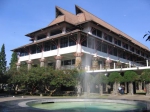ITB’s FCS Team Educates on Organic Waste Management with Composter Bag in Kertagraha Hamlet Bali
By Adi Permana
Editor Adi Permana

DENPASAR, itb.ac.id – ITB’s For-Community Service (FCS) Team ‘Bali Mereresik’ re-accomplish another socialization program revolving around domestic waste management and composter bag distribution. Their current agenda was executed on Sunday (17/7/2022) in Kertagraha Hamlet’s pendhapa hall, Kesiman Kertalangu Village, East Denpasar, Denpasar City, involving the women of Family Prosperity Empowerment (FPE) and attended by the inhabitants of Kertagraha Hamlet.
Socialization was done at the same time as the FPE women’s monthly meeting in the third week of each month. Beforehand, the people of Kertagraha have applied some policies regarding waste management. One of them is the periodical meetings, where each FPE member must bring non-organic wastes to be recycled and then gathered before finally given to the trash collectors. The cumulative waste data is managed by the hamlet’s waste bank, Kertagraha Terpti Waste Bank, which has been operating for two years.
Budhicahyanto, a research assistant from ITB’s Undergraduate Program in Environmental Engineering and a part of ITB FCS Team ‘Bali Mereresik’ stated, that the villagers here – especially women, can already sort and manage recyclable wastes well, the Bali Mereresik Team plans to invite them, not only on managing non-organic wastes but also organic wastes produced.
“Organic wastes that decompose and degrade naturally can be processed into fertilizers or composts. Moreover, the objective of this activity is to educate villages so they understand that waste management can be done independently in the comfort of their own backyard, there’s an alternative to sitting up in landfills,” remarked Budhi.

Domestic organic wastes are produced from food leftovers and community cooking activities. In addition, gardening wastes such as leaves, and branches can also be categorized as organic wastes. Organic waste management that can be done at home for example is waste grinding, which will be put inside a composting container such as a composter bag and added with soil. Water from rice washing is then poured into the mixture or called eco-enzyme solution from fruits as bio activator, thus organic waste decomposes quicker and does not produce disease-vector inviting scents.
The villagers who attended this event seemed enthusiastic and earned new knowledge regarding organic waste management, which is simple and odorless. “This program from ITB is very insightful. Now I know how to process leftovers at home. All this time, wastes are merely buried or thrown away, even though organic wastes can be utilized as composts to be reused,” expressed Karnila – one of Kertagraha Hamlet’s residents who also acts as the local head of Family Welfare Empowerment.
Kesiman Kertalangu Village is one of the many villages supervised by ITB’s FCS Team ‘Bali Mereresik’. Previously, the team has executed various projects in this village, such as the Biaung Beach shore cleaning agenda, Friday (24/6/2022) with the Bali Province’s Indonesian Red Cross Society and the Trash Hero Indonesia Community: Chapter Kertalangu. The activity of giving composter bags to the villagers of Kertagraha Hamlet will hopefully increase the number of recycled wastes and reduce landfill piles, with the Suwung Landfill’s concerning condition at Denpasar, Bali, in mind, with it being nearly overcrowded and will possibly be demolished.

Under the guidance of ITB’s Environmental Engineering program lecturer – Dr. I Made Wahyu Widyarsana, FCS ITB Team Bali Mereresik, membered with the students of Undergraduate Program in Environmental Engineering FCEE ITB, as well as research assistants from the same study program, the team executed various projects with the objective of optimizing waste management in the Bali Province.
This program is one of the many community givebacks programs coordinated by the Institute for Research and Community Services ITB (IRCS ITB). The program is also a part of the ‘Merdeka Belajar Kampus Merdeka (MBKM)’ or Independent Learning Independent Campus (ILIC) program, involving students and giving them the opportunity to learn directly from communities.
Reporter: Environmental Engineering FCS Team Release
Translator: Firzana Aisya (Bioengineering, 2021)

.jpg)
.jpg)
.jpg)
.jpg)
.jpg)


